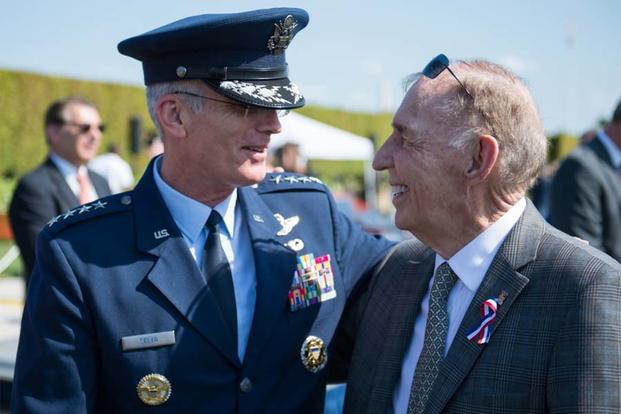Retired Navy Capt. Gerald L. "Jerry" Coffee used a lectern on the Pentagon's parade ground Friday to tap out the code U.S. prisoners of war in North Vietnam used in their cells every night to shore up their morale and resilience.
With the fingers of his right hand, Coffee tapped several times."That's a 'G,' " he said. Then came an "N" and a "G," a "B," and an "A" -- the letters distinguished by the number of taps.
The 82-year-old Coffee translated for the audience at the Pentagon's annual POW/MIA Recognition Day ceremony, attended by Defense Secretary Ashton Carter; Air Force Gen. Paul Selva, vice chairman of the Joint Chiefs of Staff; and families of the missing.
The message he tapped out was "Good Night. God Bless America." Coffee said, "At the end of every day, we'd sign off and say, 'Good Night. God Bless America' -- every single night."
The Pentagon ceremony was one of many across the country on the third Friday of September, the annual observance of National POW/MIA Recognition Day.
In his official proclamation, President Obama said, "The hardship experienced by prisoners of war and by the family members of those who have gone missing in action is unimaginable to most Americans.
"It is our country's solemn obligation to bring these heroes back to the land they served to defend, and to support the families who, each day, carry on without knowing the peace of being reunited with their loved ones," he said.
The Pentagon's Defense POW/MIA Accounting Agency lists more than 82,600 Americans as "unaccounted for from past conflicts," including 73,121 from World War II; 7,795 from Korea; 1,618 from Vietnam; and 126 from the Cold War.
In his remarks, Carter said the national day of recognition was an opportunity "to recommit ourselves to fulfilling our solemn pledge -- to make every effort to bring all of them, all of them, our men and women, home to their families."
"Since we came together last year on POW/MIA Recognition Day, we've accounted for over 135 missing service members. Missing personnel like Navy Lt. Julian Jordan, who served on the USS Oklahoma at Pearl Harbor that fateful December day 75 years ago," Carter said. "We won't stop -- I won't stop -- until we achieve the fullest possible accounting for our missing."
For Coffee, the tap code messages symbolized the unique POW fellowship that enabled them to survive. "We POWs looked at our time then in the prisons of Vietnam as another form of combat. We never ever gave up, we never ever gave in, we never lost faith in our country," he said.
Coffee was flying an RA-5C Vigilante as part of Reconnaissance Squadron 13 off the carrier Kitty Hawk when he was shot down in February 1966. "I was finally released from the Communist dungeons of Hanoi in February 1973 -- seven years and nine days," he said.
"The tap code was very important in giving comfort and solace to one another -- when you know that the man in the next cell was down and hurting, his feet locked in the ankle cuffs at the foot of a concrete slab, his hands cuffed tightly behind him," Coffee said.
Those few taps on a wall told a fellow prisoner that there was someone on the other side saying, "Be tough, babe. I'm praying for you," Coffee said.
-- Richard Sisk can be reached at Richard.Sisk@Military.com.






























